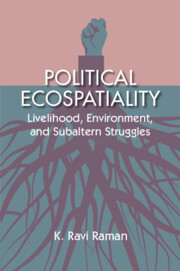Book contents
- Frontmatter
- Contents
- Acknowledgements
- 1 What Is Politics Proper? Why Political Ecospatiality Matters?
- 2 Birlas in Communist Kerala: Clash and Consensus as Subaltern Narratives
- 3 Occupy Muthanga: Land, Forest, and Reinventing Indigeneity and Identity
- 4 Dalits and the Global Cola: Water, Power, and Resistance
- 5 Politics, Epistemology, and Environmental Modernity: Anti-endosulfan as Ethical Practice?
- 6 Caste, Land, and the State: What If Chengara Took the Place of Muthanga?
- 7 Pombilai Orumai: Plantation Dalits, Intersectionality, and Power
- 8 Ecospatiality: Right-Making/State-Making
- Index
5 - Politics, Epistemology, and Environmental Modernity: Anti-endosulfan as Ethical Practice?
Published online by Cambridge University Press: 31 August 2024
- Frontmatter
- Contents
- Acknowledgements
- 1 What Is Politics Proper? Why Political Ecospatiality Matters?
- 2 Birlas in Communist Kerala: Clash and Consensus as Subaltern Narratives
- 3 Occupy Muthanga: Land, Forest, and Reinventing Indigeneity and Identity
- 4 Dalits and the Global Cola: Water, Power, and Resistance
- 5 Politics, Epistemology, and Environmental Modernity: Anti-endosulfan as Ethical Practice?
- 6 Caste, Land, and the State: What If Chengara Took the Place of Muthanga?
- 7 Pombilai Orumai: Plantation Dalits, Intersectionality, and Power
- 8 Ecospatiality: Right-Making/State-Making
- Index
Summary
This chapter addresses how politics, epistemology, and modernity are co-produced, and, in this process, how the pre-defined notions of politics, epistemology, and modernity themselves are transformed and reconstructed. The emergent theoretical framing is empirically informed by the place-specific campaign against the aerial spraying of endosulfan pesticide wherein ‘life is cheaper than cashew’. The chapter highlights the structural connections between global capitalism and state-driven developmentalism but also how the very state was conscientized by the transverse solidarity of the ‘constituent power’, including the victims and the larger civil society as agents of modernity, the latter understood as resistance for egalitarianism. However, it does not stop there. We shall also touch upon the ‘epistemological break’ (Bachelard 1938; Althusser 1969) that has occurred in the larger context of knowledge controversies and conflicts (see Whatmore 2009).
In May 2010, the left-front government in the Indian state of Kerala took the historic decision to ban more than a dozen toxic pesticides in the state. This was the culmination of over a decade and a half of struggle and movements in protest against the aerial spraying of endosulfan on the state-owned cashew plantation in the northernmost district of Kasaragod. This chapter follows the prolonged struggle led by the victims of the deadly pesticide, the awakening of a general consciousness among the public, the building up of transverse politics and solidarity, and, finally, the persuasion of the state to ban the pesticide, along with other toxic wastes. The chapter is situated in the larger context of what Beck (1986), Habermas (1987), and Gaonkar (2001) would call risk society, a society in which modernity has become ‘a theme and a problem for itself’, and thus the crisis inherent in it is to be managed through a reinvention of politics. The chapter suggests that the concept of risk society and reflexive modernity as the outcome of a series of struggles and movements demanding the ban on endosulfan in the state offers fresh insights into the power of the people and the civil society in joining the victims.
- Type
- Chapter
- Information
- Political EcospatialityLivelihood, Environment, and Subaltern Struggles in Kerala, pp. 126 - 150Publisher: Cambridge University PressPrint publication year: 2024

